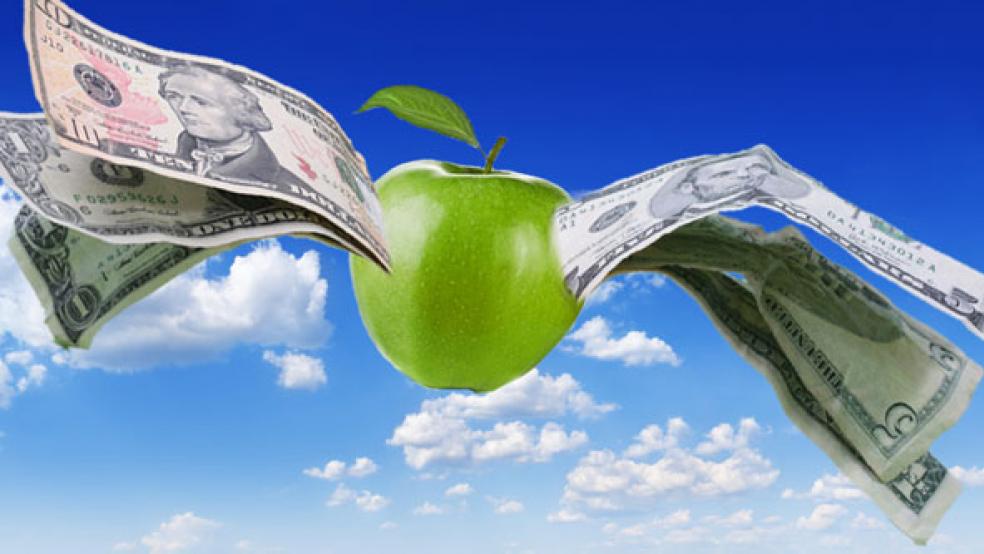Can Apple (AAPL) thrive without Steve Jobs at its helm? Months after the legendary founder of Apple succumbed to cancer, the resounding reply to that question appears to be in the affirmative. Indeed, after recording a rare earnings “miss” in the third quarter of last year, Apple blew analysts’ forecasts out of the water late yesterday when it reported a blockbuster fourth quarter, the best on record for both sales and revenues. Indeed, total revenue soared 73 percent from year-earlier levels, meaning that the company booked more in sales in that fourth quarter than it had in the other nine months of 2011.
It’s all about smartphones – and despite competition from rival manufacturers, Apple’s iPhone continues to dominate the market. So great is demand that consumers are having to wait, the company’s chief financial officer told analysts on a conference call late yesterday afternoon.
The news almost instantly added $37.2 billion in value to Apple’s market capitalization, as the company’s stock price soared about $40 a share in aftermarket trading, reversing a day in which it had significantly lagged broad market indicators. (If the shares open Wednesday at anywhere near the price of $451 a share that prevailed in after-hours trading, that’s going to make the active buyers of call options in Apple with strike prices of $425 a share and up in recent days very happy indeed, giving them an instant payoff of up to $25 a share on the relatively small investment to acquire the options themselves.)
After a string of underwhelming earnings from bellwether companies, some traders had begun bracing for a shock from Apple as well. After all, the company, which tends to be extremely conservative when it comes to providing guidance to analysts, had long had a history of trouncing forecasts when it reported actual earnings – right up until last fall’s disappointment. Some uneasy traders had begun wondering whether such disappointments might be a hallmark of the new post-Jobs Apple, although those jitters weren’t reflected among analysts, all but a handful of whom have remained bullish and kept “buy” ratings on the stock over the last three months.
Apple’s success selling iPhones and the fevered demand for smartphones in general poses some interesting questions about the outlook for telecommunications service providers like AT&T, however. For every smartphone an eager Apple consumer buys, AT&T and other providers have to deliver service – and it’s a costly struggle to provide enough spectrum to serve those customers. That’s something to ponder, both for investors looking for an additional way to “play” the smartphone trend and for smartphone owners themselves.
For now, however, the only people likely to be somewhat unhappy with Apple’s astonishing quarter are the folks over at Amazon (sales of Apple’s relatively costly iPad device were robust, proving that Amazon’s (AMZN) Kindle Fire isn’t going to eradicate demand for the premium-priced product) and perhaps the analysts themselves. After all, it isn’t often that pundits get it so terribly wrong, and underestimate the amount of bullish news. But then who would have predicted that with all the costly television ads touting other smartphones over the holiday season, sales of iPhones would hit 37 million during the quarter, driving Apple’s smartphone market share to 25 percent from 18 percent in mid-2011.
Now there are only two questions on investors’ minds: When will Apple stock finally blow through the $500 level (the median forecast is $515 a share) and what on earth is Apple going to do with its even-larger cash mountain, now at $97.6 billion? As Howard Silverblatt, senior index analyst at Standard & Poor’s, noted after the earnings announcement, the jump in market capitalization makes Apple the largest company in the world, bypassing Exxon Mobil (XOM). But Exxon pays a dividend, so investors get to collect a yield of 2.16 percent, and own shares that trade at a relatively modest 10.36 times earnings. Apple, on the other hand, has yet to pay investors a dividend at all, despite sitting on cash that exceeds the gross national products of a number of countries in the world – and it trades about 15 times trailing earnings.
That’s an issue Apple’s board is going to have to confront. After all, the company has proved its ability to stay ahead of the game in research and development and still accumulate a massive amount of cash. After a certain point, keeping so many billions in cash is about as sensible as storing wads of dollar bills in your mattress. Peter Oppenheimer, the company’s chief financial officer, may try to assure investors that the company and board are actively discussing what to do about this “problem,” but shareholders will be increasingly anxious for them to finally make a decision.
Indeed, speculation that Apple will finally join the ranks of dividend-paying stocks in light of this upbeat earnings report is likely to keep the stock buoyant in coming weeks, putting a floor under the share price once the market has finished digesting the news. Don’t bet on being able to buy the stock back where it was before the earnings announcement for some weeks to come.





